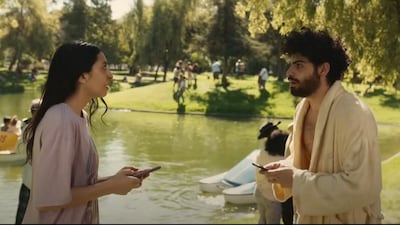Remember the days when there was no need for face masks, social distancing or Zoom calls? Well, while we're not quite there yet, it doesn’t hurt to dream.
Now, a new advert from Extra gum that’s gone viral has us all imagining what life will be like post-pandemic. The video has been watched more than 1.5 million times since it was posted on YouTube on May 3.
The commercial, titled For When It's Time, takes place "sometime in the not so distant future" and envisions the day when lockdowns (and all their measures) finally end.
Set to Celine Dion's 1996 hit It's All Coming Back to Me, the video starts with a radio announcement: "And this just in, we are back! We can see people again! How about that?" before cutting to different listeners hearing the news.
Soon, bearded men emerge from their apartments, people quickly log off Zoom and couples are able to meet up in parks without the need for masks or social distancing.
Of course, in the end, it is still a commercial for gum. However, the promise of life returned to normal has likely helped the advert reach viral heights.
Viewers have also made this known by commenting on the video, with one saying, "this is perhaps the best reopening commercial I've seen". Another commenter added: "This ad made my day."
Other post-pandemic posts that have gone viral
Last month, a social media post from illustrator and cartoonist Tomer Hanuka, who lives in New York, was retweeted more than 35,000 times. He shared a thread in which he asked his third-year university illustration students to imagine life after the pandemic in the style of a New Yorker magazine cover.
Each cover illustrated by the students explores themes such as reconnection, loss and nature. A poignant cover image created by Dou Hong showed two figures on a park bench: one an older woman, the other an outline of a man but instead filled with names of Covid-19 victims. It was liked almost 60,000 times.
With the semester almost done, Hanuka told The Washington Post that he gave them the faux-cover assignment because he was "looking to send them off in a positive state of mind".
Google also created a well-received video called Get Back to What You Love on March 23, in a push to encourage more people to get vaccinated, that also imagined post-pandemic life. The video has been watched more than 11 million times since its upload.
The minute-long video chronicles search terms throughout the pandemic and illustrates how those terms may be changing as a result of vaccinations, allowing the world to reopen again to in-person events.
Google search terms transform from “sweat pants” to “pants”, with the words "virtual", "online", "postponed" and "cancelled" also disappearing from searches. There are also examples of businesses reopening again on Google Maps. The video ends with the message "Get back to what you love" with a final Google search looking up “Covid vaccine near me".


